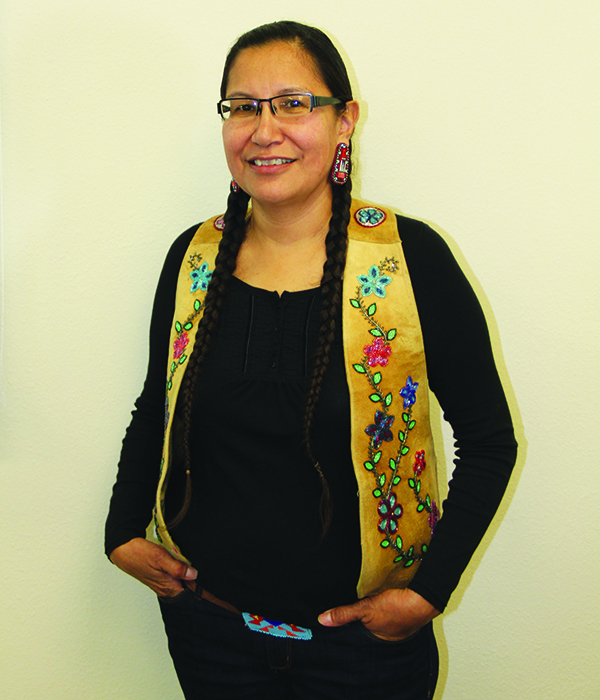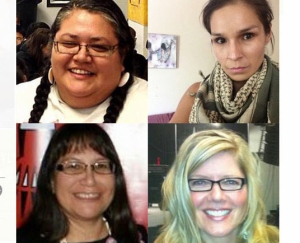
By Micheal Rios, Tulalip News
Sylvia McAdam (Saysewahum), a cofounder of the international movement Idle No More, recently spoke at the Spring World Issues Forum held at Western Washington University. Prior to her lecture, Sylvia held a special presentation at Northwest Indian College (NWIC) in Lummi to discuss her work to date and to share her mission of promoting Indigenous self-determination and knowledge.
Sylvia is a citizen of the Cree Nation who holds a Juris Doctorate (LL.B) from the University of Saskatchewan and a Bachelor’s of Human Justice (B.H.J) from the University of Regina. She is a recipient of the Carol Geller Human Rights Award, Foreign Policy’s Top 100 Global Thinkers Award, Social Justice Award, 2014 Global Citizen Award, and has received several eagle feathers from Indigenous communities. She remains active in the global grassroots Indigenous led resistance called “Idle No More”.*
Because colonization has dramatically caused the heartbreaking loss of Indigenous languages, customs, and inherent systems, Sylvia uses the oral tradition of her people to share with her fellow Indigenous peoples her dream to revitalize Indigenous nationhood. It is Sylvia’s dream, shared by many, that freedom, liberation, and self-determination will lead Indigenous peoples away from the pain of genocide and colonialism.
Following her truly riveting presentation, she sat down with Tulalip News staff to discuss several issues that are of importance to not just citizens of Tulalip, but all Native peoples.
During your presentation you mentioned as Indigenous peoples we shouldn’t identify as ‘environmentalist’ or ‘activist’, but instead view ourselves as defenders of our homeland. Why is that?
“When you begin to identify as an environmentalist or activist there’s a fear that arises because those terms can be associated with economic terrorists. The fear is rooted in the belief that environmentalism and activism affect the economy. That’s part of it, the other part is activism and environmentalism infers that there is no inherent connection to the land; you just show up and protest. However, when it comes to Indigenous people doing this kind of work, their connection, attention, and investment to the land is much different. Our history is written on the land, our ancestors are buried here, that land is our home. So we are defending and protecting our home. Being defenders of our homeland shifts the thinking, as it should, because our connection with the land is unique.”
Viewing ourselves as defenders of our homeland should also unite us as Native and Indigenous people with a set of common goals, right?
“Absolutely. When you are born you are born not only as a human being, you are born into lands. When we go home we have a very clear set of lands that we are born into and we have a responsibility and obligation to protect those lands. That’s what I continue to do every day and that’s why I tell people, ‘when you know your lands you will know your relatives.’ I’m not just talking about the human relatives, I’m talking about the land, the plants, and all the animals, the flyers, the crawlers and the swimmers. Those are all our relatives and right now they have no agency to defend and protect themselves. That’s where we need to step up because the forces that threaten our land and humanity are very identifiable right now. Those forces are the extractive corporations that are going into our lands, almost in a frenzy, to take the very things we need to sustain us.”
Some of the forces that continue to threaten Native culture and Indigenous identity are more covert than others. You mentioned the term ‘ethnocide’ earlier. Can you explain that?
“We speak about genocide, but people forget about ethnocide. Ethnocide is the death of the way of being of people; the things that we need to carry us on as a people. Ethnocide is the taking of our trees, the taking of our water, and the taking of our plants. What then do we have to carry our ceremonies on? The ceremonies are pivotal and integral in who we are as a people. If you could not have trees to make your canoes, what then? If there are no trees then there are no forests to harvest from. If the waters and oceans are poisoned and you can no longer perform your ceremonies, then what happens to your songs and the language? How does your culture live on? You lose who you are as a people. That’s ethnocide.”
The idea of disenrollment based upon blood quantum is gaining traction amongst many tribes. It’s based on a system of thought not of our own, but passed down from colonization. What are your thoughts on disenrollment?
“It’s so unfortunate because it seems we’re always in the realm of inadequacy. We’re always inadequate; its either we have too much culture or not enough culture. We’re always in that measure of inadequacy. Ultimately, we can turn to our ancestors to see we never throw away our relatives. We never throw them away, even the ones we have come to adopt. It’s against our culture and against our natural laws as Indigenous peoples. At the end of the day, if you can demonstrate and show to me where your lands and your relatives are, then doesn’t that speak for itself? Every child, every original peoples’ child is born into lands. They have an inherent right to protect and defend those lands. No human can take that away from them.
If you are dis-enrolling children, then you are taking away their inherent obligation and jurisdiction into the lands they are born into. No human being has that right. It’s against our laws to do that. For every Indigenous child born it’s the duty of the parents to make sure that child is connected into the land, so that when they grow up they will defend and protect their relatives who don’t have agency to defend themselves.”
What astounds you most when you look back at all you’ve experienced and achieved over the past few years with Idle No More?
“The amazing courage of grass-roots people when they set their minds to things. That’s what blows me away. The courage and determination of so many individuals who unite and come together for a common goal is what drives Idle No More. On a global scale, we got a message from the Amazon, from the original peoples there, and they told us they were trying to stop the development of a dam. While defending their homeland they were opposed by paramilitary brought in to keep them away from the dam site. On one occasion they were standing there with their spears and bow and arrows chanting ‘Idle No More!’ while the paramilitary pointed their guns at them. They told us Idle No More was their battle cry.
So when I start to feel discouraged or overwhelmed I remind myself of these stories to remember I’m not alone. I have to be a voice for those who can’t speak for themselves and continue this work. If I don’t, then what am I going to tell my grandchildren when they ask me, ‘what did you do to protect and defend our culture and homeland?’ I want to be able to tell them I did everything that I could. That’s why I’m here.”
*source: http://www.idlenomore.ca
Contact Micheal Rios, mrios@tulaliptribes-nsn.gov


 Derrick on December 10th 2013
Derrick on December 10th 2013